Unveil the enigmatic role of temple prostitutes in the Bible, where faith, morality, and ancient practices intriguingly converge.

Temple Prostitutes in the Bible
In ancient texts, you'll find warriors and kings, prophets and priests, but among them, temple prostitutes hold a narrative all their own. You might wonder how these figures fit into the moral and religious tapestry of the Bible. Their roles and duties, often shrouded in mystery and controversy, offer a unique lens through which to view gender dynamics and religious practices of the time.
As you explore their historical context and cultural impact, you'll uncover layers of meaning that challenge conventional understanding. This journey into the past will reveal more than just historical facts; it invites a broader conversation about the complexities of faith and morality.
Key Takeaways
- Temple prostitutes played integral roles in ancient religious and economic systems, contributing to temple wealth.
- Biblical texts mention temple prostitution, sparking debates on morality and translation accuracy.
- Their sacred functions and societal importance underscored complex gender dynamics and social structures in ancient times.
- Modern ethical considerations prompt reevaluation of their roles, challenging simplistic moral judgments.
Historical Context
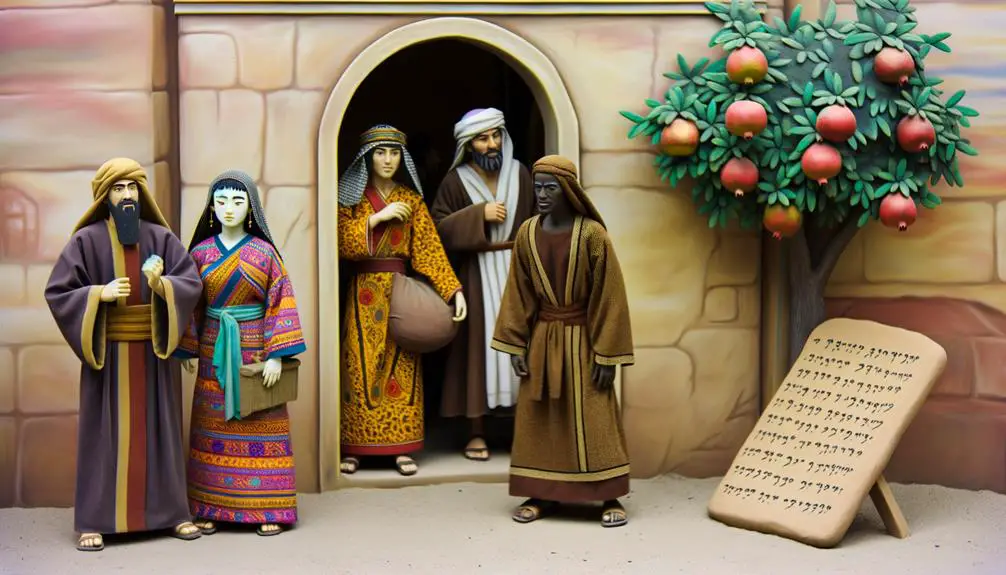
To understand the role of temple prostitutes in ancient societies, it's essential to first grasp the broader historical context in which they operated. These individuals didn't exist in isolation; rather, they were integral components of ancient economies and societal norms. This complex backdrop is crucial for appreciating their position and function within the cultures that embraced such practices.
In many ancient civilizations, economic structures were deeply intertwined with religious and cultural institutions. Temple prostitutes, serving in sacred precincts, exemplified this interconnection. They weren't merely engaged in physical transactions; their roles were imbued with religious significance, operating within the sanctioned frameworks of their societies. This arrangement reflects how ancient economies weren't purely materialistic but were also shaped by spiritual beliefs and rituals. The income generated through their services often contributed to the temple's wealth, showcasing a direct link between religious practices and economic sustenance.
Societal norms of the time also played a critical role. Unlike modern perceptions, the practice of temple prostitution wasn't universally regarded as immoral or degrading. In many cases, it was seen as a form of divine service or a ritualistic act that connected the human with the divine. This perspective was deeply rooted in the belief systems of these societies, indicating a vastly different understanding of sexuality and sanctity than what's prevalent today.
Thus, examining the role of temple prostitutes within ancient economies and societal norms reveals the complexity of their existence. It's a reminder that their lives and work were shaped by the intricate web of religious, economic, and social forces prevailing in their time.
Biblical Mentions

Having established the broader historical context, we now turn our attention to how temple prostitutes are referenced within the pages of the Bible, revealing a complex relationship between ancient religious practices and scriptural narratives. The subject of temple prostitution in the Bible is rife with interpretation debates and translation issues, challenging scholars and readers alike to consider the nuances of ancient texts and their implications for understanding historical religious practices.
Biblical Reference |
Notable Interpretation Debates |
|---|---|
Deuteronomy 23:17-18 |
The prohibition against bringing the wages of a dog or a harlot into the house of the Lord has sparked discussions on whether this refers explicitly to temple prostitutes or a broader category of immoral earnings. |
1 Kings 14:24 |
The mention of "male cult prostitutes" in the land during Rehoboam's reign has led to debates over the accuracy of translation and the specific roles these individuals played in religious rites. |
Hosea 4:14 |
Interpretations vary on whether this passage condemns the practice of engaging with temple prostitutes or reflects a more general critique of societal morality and fidelity. |
1 Corinthians 6:15-16 |
Paul's admonition against uniting with a prostitute challenges readers to consider the cultural and religious context of Corinth, including the potential reference to temple prostitution within Greco-Roman religious practices. |
These references underscore the translation issues and interpretation debates that scholars face when analyzing biblical texts related to temple prostitution. It's essential to approach these passages with a critical eye and a deep understanding of the historical, cultural, and linguistic contexts in which they were written.
Roles and Duties
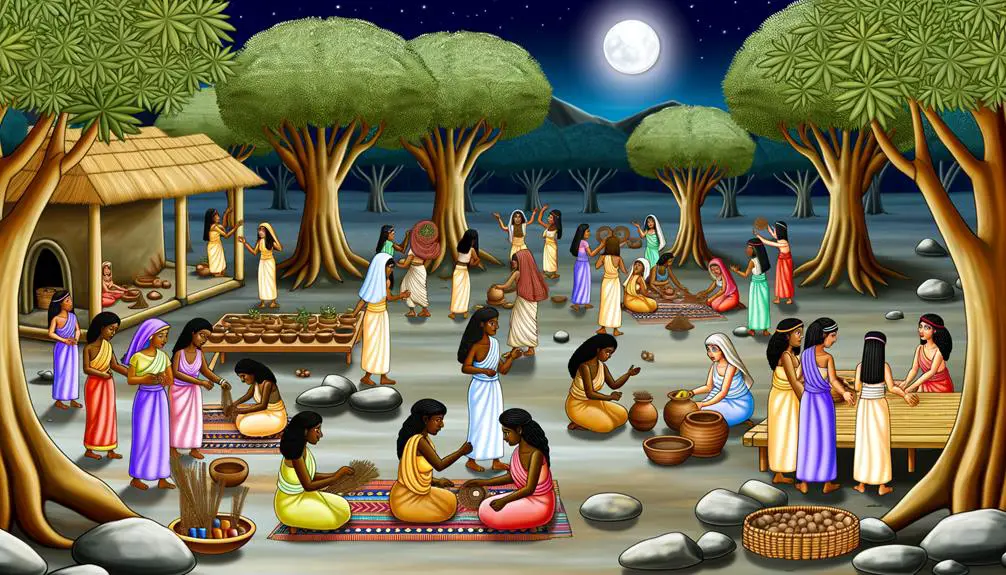
As you explore the roles and duties of temple prostitutes in the biblical context, it's crucial to understand their sacred functions and the broader social implications of their work.
You'll find that these individuals played complex roles that were deeply intertwined with religious practices and societal norms of the time.
Analyzing these aspects sheds light on the multifaceted nature of their duties and their impact on ancient societies.
Sacred Functions
Within the context of ancient religious practices, temple prostitutes held a variety of sacred functions and duties integral to the worship and rituals of the time. These individuals, often serving in the temples of fertility deities, weren't merely participants in sexual rites but were central to maintaining ritual purity.
Their roles were deeply intertwined with mythological parallels, embodying the divine union between gods and goddesses, which was believed to ensure fertility of the land and prosperity for the community. Through their sacred functions, temple prostitutes thus served as conduits between the divine and the mortal, enacting rituals that mirrored mythological narratives.
This symbolic participation underscored their indispensable role in the spiritual and social fabric of their societies, highlighting the complexity of their duties beyond mere physical acts.
Social Implications
The roles and duties of temple prostitutes significantly influenced the social structures and norms of ancient societies, reflecting a complex interplay between religious beliefs and community life.
You're navigating through a topic that intersects with modern perceptions and ethical debates, shedding light on how ancient practices are understood and judged today.
These figures weren't merely subjects of their time but played pivotal roles that impacted economic, religious, and social frameworks. They challenged and reinforced societal norms, contributing to a societal fabric that was deeply entwined with religious practices.
As you delve deeper, you'll find that the ethical debates surrounding their roles mirror broader conversations about morality, autonomy, and the sacredness of the body within historical contexts, offering insights into the evolving understanding of human dignity and rights.
Gender Dynamics
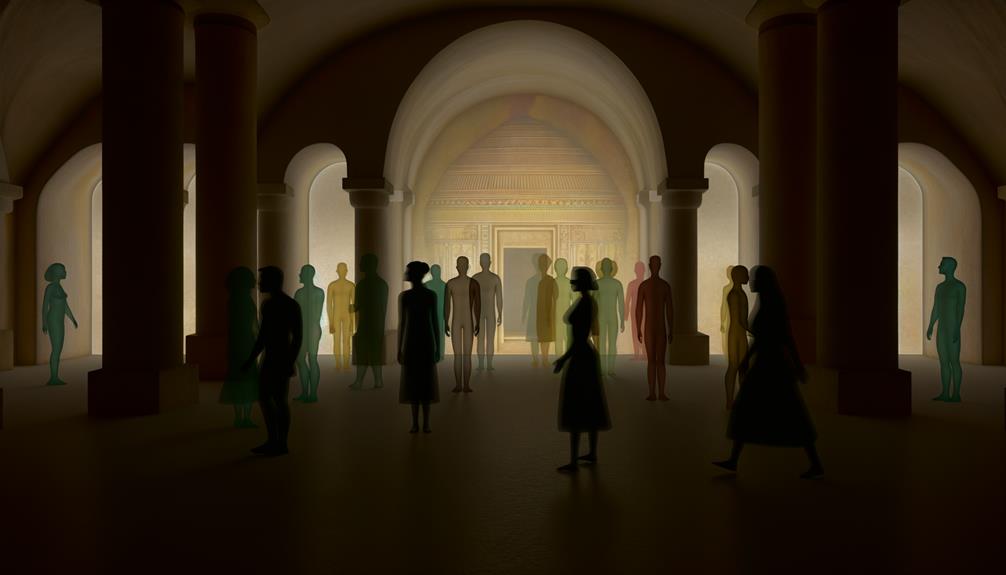
Exploring the role of temple prostitutes in ancient texts reveals complex gender dynamics that challenge modern perceptions of agency and exploitation. Power dynamics within these ancient practices provide a fertile ground for feminist perspectives, shedding light on the nuanced positions women and men occupied in religious and social hierarchies. You'll find that, contrary to a simplistic victim narrative, the reality was often much more complicated, intertwined with notions of sacred duty, societal status, and personal autonomy.
From a feminist viewpoint, the existence of temple prostitutes prompts a reevaluation of historical narratives centered on gender roles. It's essential to recognize that these roles weren't merely imposed by patriarchal systems but were also shaped by economic, religious, and social factors. This acknowledgment doesn't excuse the exploitation that undoubtedly occurred but allows for a more nuanced understanding of ancient societies.
Moreover, the gender dynamics at play weren't solely about subjugation or empowerment; they were about survival within the constraints of the era's societal structures. Women who served as temple prostitutes, in some contexts, might've wielded a certain degree of influence or enjoyed a special status, albeit within a system that ultimately favored male dominance. This complexity forces you to consider the various shades of agency that could exist, even in seemingly oppressive circumstances.
In dissecting these ancient practices, you're encouraged to look beyond the surface and appreciate the intricate interplay of gender, power, and religion. It's a reminder that historical narratives on gender roles and sexuality are seldom black and white, but rather shades of gray that require careful examination and understanding.
Religious Significance
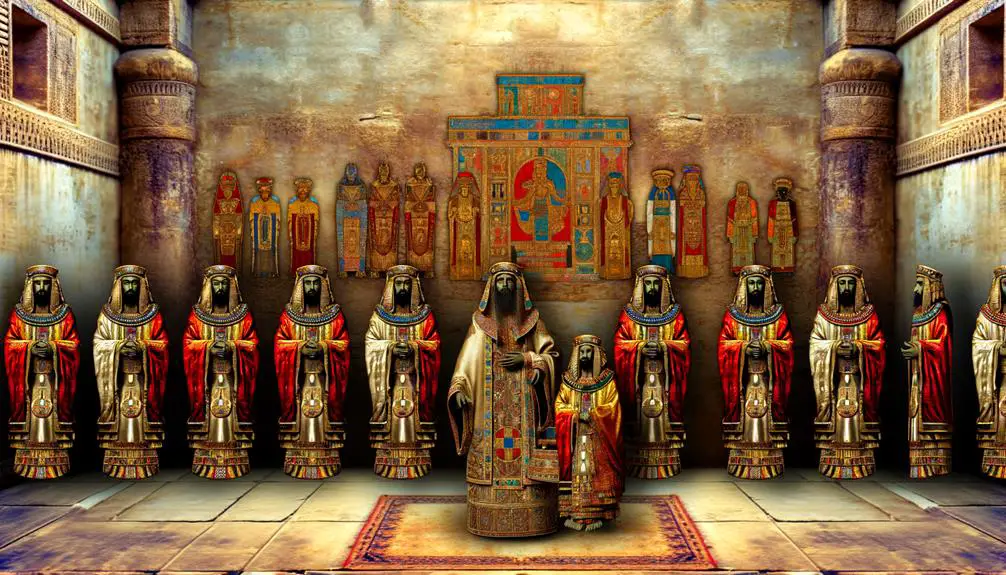
Delving into the religious significance of temple prostitutes, it becomes clear that their roles transcended mere physicality, embodying complex spiritual and societal dimensions. You'll find that their existence was intertwined with the worship practices of ancient Near Eastern religions, often serving as intermediaries between the divine and the mortal. This role positioned them uniquely within both the religious and societal hierarchies of the time.
Modern perceptions of temple prostitutes are fraught with controversy and ethical debates. These discussions often pivot on the interpretation of ancient texts and the projection of contemporary morals onto historical practices. It's essential to approach the subject with a nuanced understanding, recognizing the vast differences in context between then and now.
The table below outlines key aspects of the religious significance of temple prostitutes and how they're viewed today:
Aspect |
Description |
|---|---|
Intermediary Role |
Served as a bridge between worshippers and the divine, facilitating a connection thought to be essential for spiritual communication. |
Fertility Rituals |
Participated in ceremonies believed to ensure agricultural prosperity and human fertility, embodying the goddess's power. |
Economic Contribution |
Offered their services in exchange for offerings to the temple, playing a significant role in the economic sustenance of religious institutions. |
Ethical Debates |
Modern discussions often critique the practice from a human rights perspective, questioning the agency and autonomy of individuals involved. |
Perception Shifts |
Historical understanding continues to evolve, challenging earlier interpretations that may have been colored by the biases of the interpreters. |
Understanding the religious significance of temple prostitutes invites a more informed conversation about their roles, avoiding simplistic judgments and appreciating the complexity of their contributions to their societies.
Cultural Impact
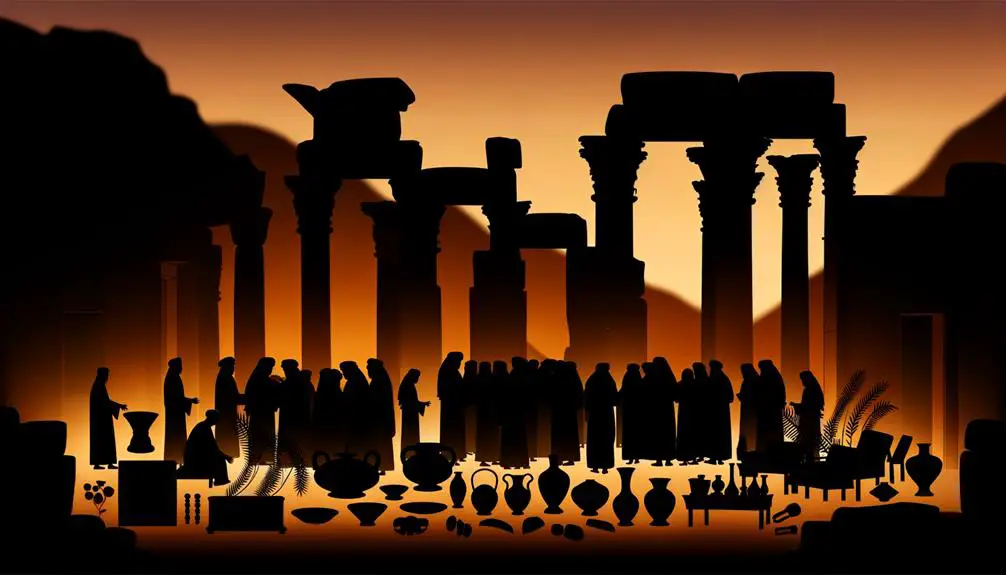
Cultural influence of temple prostitutes profoundly shaped societal norms and religious practices across ancient civilizations, challenging us to reconsider modern perceptions on spirituality and morality. The integration of sexuality and the divine in these societies offers a stark contrast to contemporary views, where the two are often seen as separate, if not opposing, realms. This historical practice invites us to reflect on ethical considerations surrounding the body, sexuality, and spiritual expression.
You'll find that temple prostitution, as documented, wasn't merely a profession but a deeply ingrained societal role, intertwined with rituals believed to ensure fertility, prosperity, and divine favor. This intertwining of the sacred and the sexual underlines a holistic view of human existence that many modern cultures have moved away from, favoring a compartmentalization of spirituality.
The role of temple prostitutes also prompts a reevaluation of gender roles and power dynamics within ancient religious practices. It's crucial to analyze these roles with nuance, recognizing both the agency given to individuals within these roles and the constraints placed upon them by societal expectations. This nuanced understanding allows for a more respectful and accurate interpretation of their impact on culture and religion.
Furthermore, exploring the cultural impact of temple prostitutes challenges us to confront our own biases and ethical considerations regarding sexuality and spirituality. It encourages a broader perspective, one that acknowledges the complexity of human beliefs and practices without imposing modern moral judgments.
Frequently Asked Questions
How Did the Practice of Temple Prostitution Affect the Personal Lives and Family Relationships of Those Involved?
You'd find that the practice deeply impacted individuals' personal lives and family relations.
The religious implications often led to societal ostracization, causing emotional trauma not just for those directly involved, but also for their families.
This strain could disrupt family bonds, leading to isolation.
Moreover, the emotional toll on the individuals could result in long-lasting psychological effects, affecting their ability to form and maintain healthy relationships outside their professional obligations.
Were There Any Known Health Implications or Societal Health Measures Taken Concerning Temple Prostitutes in Ancient Times?
In ancient times, public health practices were primitive, and disease transmission among temple prostitutes posed profound problems. Without modern medical knowledge, societies struggled to stem the spread of sexually transmitted infections.
Insightfully, some cultures implemented rudimentary health measures, like regular purification rituals, but these had limited effectiveness. Your understanding of this issue underscores the complex interplay between public health concerns and societal practices, revealing a nuanced perspective on historical health management.
How Did Contemporary Societies Outside the Biblical Context View the Practice of Temple Prostitution?
You're looking into how societies outside the biblical context perceived temple prostitution, focusing on cultural practices and religious perceptions. It's key to understand that these views varied widely. Some cultures accepted it as a sacred duty, integral to their religious practices, while others viewed it with skepticism or outright condemnation.
This divergence largely stemmed from differing religious beliefs and the roles assigned to sexuality and spirituality within those societies. Analyzing these perspectives offers profound insights into ancient moral and ethical frameworks.
Were There Any Recorded Instances of Individuals Voluntarily Choosing to Become Temple Prostitutes, or Were Most Coerced or Born Into the Role?
You're exploring whether individuals chose to become temple prostitutes or were mostly coerced. It's complex.
Some were indeed drawn by religious motivations, seeing it as a spiritual calling or duty. Others were influenced by economic factors, such as poverty, seeing it as a viable means of survival.
However, coercion and being born into the role were also prevalent. The decision wasn't always black and white and varied greatly across different cultures and periods.
How Has the Interpretation of the Term "Temple Prostitute" in Biblical Texts Evolved With Modern Scholarship and Linguistic Analysis?
Modern scholarship has blown the doors wide open on understanding ancient texts, and that includes dissecting the term 'temple prostitute.'
Through a microscope of textual discrepancies and cultural biases, you'll find interpretations have radically shifted.
Scholars now argue that earlier readings may have been clouded by contemporary prejudices, not least of which include translations swayed by societal norms of the day.
It's a fascinating, respectful reevaluation that continues to evolve with each linguistic turn.
Conclusion
In conclusion, temple prostitutes in the biblical era were pivotal, serving roles that intertwined with the fabric of society like threads in a tapestry.
Their duties, deeply rooted in religious practices, reflected complex gender dynamics and had a profound religious significance.
Analyzing their existence and roles offers a nuanced understanding of the cultural impact they had, shedding light on the intricate interplay between sexuality, spirituality, and society in ancient times, and inviting a respectful, scholarly reconsideration of their legacy.


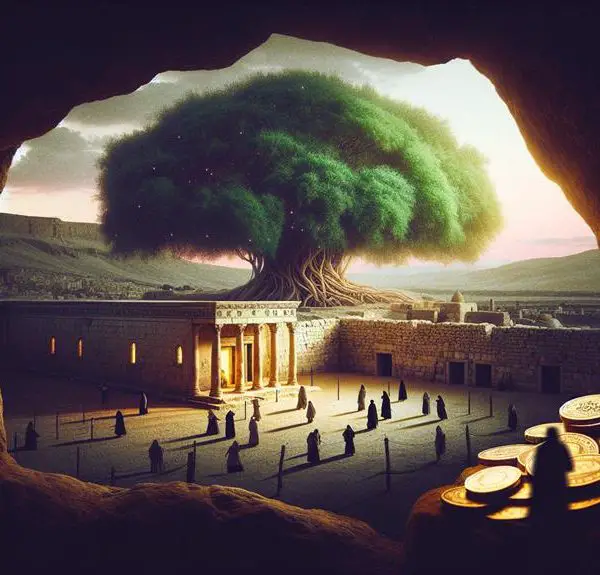
Sign up